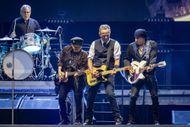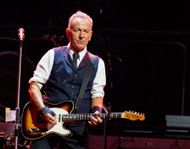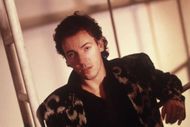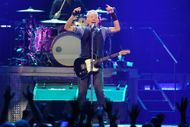Bruce Springsteen is one of the few names capable of evoking the heart and gritty power of American rock and roll. The legend has a long way to go, and not just in his 21 studio albums and endearing compilation records, as Bruce Springsteen, known best as The Boss, has an incomparable legacy spanning more than five decades.
He has made the plight of the working man and his ambitions an immortal tune, as in Born to Run or The Rising. Outside the studio, Bruce Springsteen has also established himself in almost all aspects of American culture: he has written the best-selling autobiography, Born to Run, dazzled at his own Broadway residence, and had some of the most intimate conversations in a 2021 podcast, alongside Barack Obama, Renegades: Born in the USA.
Having 20 Grammy Awards under his belt, as well as being inducted into the Rock & Roll Hall of Fame and the Songwriters Hall of Fame, Bruce Springsteen continues to tirelessly showcase legendary live shows that could even last more than four hours. His music is so well-loved because it is fundamentally about a generation of Americans looking for hope, freedom, and the open road; it was a soundtrack to life that just plays on and on.
Albums such as Nebraska and Wrecking Ball show that he has never shied away from addressing the darker elements of the American story, economic misfortune being one of them, political malaise another. His E Street Band has been one of the tightest, most devoted bands in rock history, playing with him on the golden run of successive marathon tours that established a reputation of twofold vaults of energy and heart.
It is a decade-by-decade demonstration that rock and roll ought not to have lost its gravity, that there are still real stories to tell, that listeners still need to be reminded that the promise of America, like it or not, is always something worth singing about.
Disclaimer: This article contains the writer's opinion. The reader's discretion is advised!
Here are the top 6 greatest Bruce Springsteen songs of all time
These are the best tracks by Bruce Springsteen. Each one shows his skill in turning day-to-day life into songs that feel both close to the heart and big enough for us all. Through years and albums, these tracks show his way with words, his big sound with the E Street Band, and how each word can feel like a deep promise or a heartfelt prayer.
From the young run of Born to Run to the deep truth in The River, these songs are why The Boss still stands tall in rock. His words and tunes fill cars, bars, and huge sing-alongs all over.
1) Born to Run (1975)
By releasing Born to Run in 1975, Bruce Springsteen was not merely releasing a chart-topping song but opening the gates of a new world where all the children trapped in the dead ends of their towns could find an escape.
With the musical beats of Clarence Clemons, pounding drums of Max Weinberg, and the vocals of Bruce Springsteen himself swinging ever so high, the song posed a cinematic rush that was composed of a mixture of rock, soul, and the glamour of the Phil Spector Wall of Sound recording techniques.
It is the song that made Bruce Springsteen of New Jersey's bar line-up into the American rock boss, The Boss. And not just another classic rock tune, Born to Run became the voice of thousands of restless kids whose only desire is to get out and run as fast as the engine, grab their girl, and race through the highway with no cell phone service and no address, just with hope.
Lines such as "Tramps like us, baby, we were born to run" are roaring back at Bruce Springsteen, not sung back by a stadium full of dreamers who recognize their tale in his. The combination of scandalous love and barefaced rebellion in the song made it a rite of passage anthem that continues to blast forth both through car stereos and karaoke bars everywhere.

At one point, Springsteen indicated that he intended the song to sound like the final record a listener would hear in his or her life, the last record that he or she would ever need to hear.
And then goes the wide-eyed sense of urgency and imminent freedom that still rings fifty years later, each time the opening riff stomps is played, and we are all reminded of the fact that sometimes all you can do is stick your foot out there and just run.
Read More: 6 best The Wallflowers songs you need to hear
2) Atlantic City (1982)
In 1982, when Bruce Springsteen released Atlantic City as a single taken from his stark and haunting album Nebraska, he not only sang about a story, but he was also able to present the bleak underlay of the American dream. It is stripped bare with nothing more than his acoustic guitar and that tired voice, unlike his giant, sweeping rock songs.
The story tells the tale of two lovebirds attempting to extricate themselves from their non-viable situations that lead them to Atlantic City, where they end up even further enmeshed with the cloth of crime and doomed debt.
The first step is the actual setup of the scene by the opening line, "Well, they blew up the chicken man in Philly last night," extending brutal directness and drawing the listeners into the context of small-town violence and gang affiliation. Folding in a splinter of a beaten hope to the rubble, Bruce expounds, "Everything dies, baby, that’s a fact, but maybe everything that dies someday comes back."

And whereas the studio rendition remains gray and raw, Bruce Springsteen has frequently revisited it with the E Street Band, turning this stark grief into something more confrontational and supportive, as there is indeed something that resists defeat in his works, whatever the devastating nature of that it may be, that keeps his audience returning.
3) Dancing In The Dark (1984)
Released in 1984, the song, Dancing In The Dark, provided Bruce Springsteen with a much-needed boost to his career, which seemed stagnated at that moment. Composed on the basis of his conflict with the demands of providing a box office hit, the song encapsulated the same rage into the song of rebellious spirits all across the world.
Guided by a catchy synth riff and marked by Clarence Clemons' sax play, the song has that '80s vibe, so strong it still rocks big crowds now. Lines by Springsteen, "You can't start a fire without a spark / this gun is for hire, even when we're just dancing in the dark," show Springsteen's own need to beat his writer's block and talk to his fans.
The single took Born in the U.S.A. to new levels worldwide, and the video, which shows a young Courteney Cox being pulled out on stage to dance, has cemented the song as a song in a pop culture time capsule.
Four decades later, the song, at least Dancing in the Dark, is still burning just as bright, and it turns out that out of frustration, Bruce Springsteen struck gold.
4) The Promise
Bruce Springsteen wrote the song The Promise. It was first meant to go into his 1978 album, Darkness on the Edge of Town. But, it was not put out due to his need for things to be just right, and also the deep feeling of the song.
Bruce Springsteen grew up in Freehold, New Jersey, in a working-class home. His father drove a bus, and his mom worked as a secretary. His songs often draw on his blue-collar roots, using vivid characters and tough choices in his lyrics. One of his songs, The Promise, is a raw look at how childhood dreams clash with the hard truth.
He eventually properly released it in 2010 in a box set titled The Promise, which collected unreleased tracks recorded during the Darkness sessions, with years having passed since its live performance and fans trading bootleg copies. The story of the song is a dim continuation of Thunder Road, taking the dreamers to another morning, but in colder rays.
A certain tension in lines such as "Thunder Road, oh baby you were so right / Thunder Road, there's something dyin' down on the highway tonight" displays just how Bruce Springsteen knows how to dust off old roads and give them new scars.

Whereas some of his more flag-waving tunes are expansive, brilliant with possibilities, full of promise and potential power, as the world often is, to some degree, in hindsight, at least, The Promise is closed in, grave and constrained and sober, apparent by both its bleak piano and quiet singing, as the man counts up his unfulfilled promises and dashed illusions.
In several respects, this song is not so much the story of broken promises to other people but rather what we break with ourselves when life takes a turn off the road.
5) Thunder Road (1975)
The opener on Bruce Springsteen's Born to Run (1975), the song Thunder Road is still one of his most recognizable ones, a sentimental song of freedom and promise that made Bruce Springsteen a generation hero of those who dreamed of leaving their blue-collar hometowns.
Bruce Springsteen, instead of just staying with a simple love song, made it out to be a widescreen tale of two young people who took a step out to escape their airless environment.
The song is a movie with its bright imagery, soft piano by Roy Bittan, and Bruce Springsteen sounds like a whistling train that calls you to go somewhere. He has called Thunder Road an invitation not only to Mary, the girl of the song, but to anyone who is willing to pursue something larger.
When he belts out, "Show a little faith, there's magic in the night / You ain't a beauty, but hey, you're alright," it is sweet and rebellious, a verse that has remained among generations.

This song has become one of the rites of Bruce Springsteen concerts all over the years, as all people gather up together in the belief that somewhere down that road, you will always find another opportunity as long as you have got the guts to chance it.
6) The River (1980)
The River is the 1980 title track of The River album by Bruce Springsteen, who delves more deeply than the rock anthems and daydreaming escapism that propelled him into the popular imagination and household name.
The song reads like a confession letter telling the plight of broken promises and blue collar pressures that weigh that much like in real life when his sister Virginia and her husband were in hard times and had to survive with a humane approach.
In its sparse arrangement with a melodious harmonica, Bruce Springsteen created a beautiful image of young love being destroyed by hard economic times, a sentiment familiar to many of the audiences back in the day.
Such lines as, "Is dream a lie if it don’t come true, or is it something worse?" and "Now all them things that seemed so important, well, mister, they vanished right into the air," expose a feeling of disappointment that is still powerful after all these years.

Beyond being just a song, The River shows that Bruce Springsteen is good at turning his own life tales into a look at real truths. More than just words, it deals with life's rough flow.
In the end, Bruce Springsteen's list of songs shows his unmatched way to grab the rough, hope, and heartbreak of everyday people. Whether in the young worry of Born to Run or the tough words of Nebraska, Bruce's music mixes life in America with songs and tales of rock and roll.
Year by year, he has stayed a strong fighter for the working-class and sad hearts, proving that music can be as close and wide as life itself.
Keep reading SoapCentral for more informative content!
Also Read: Top 5 best Pink Floyd stage performances of all time
